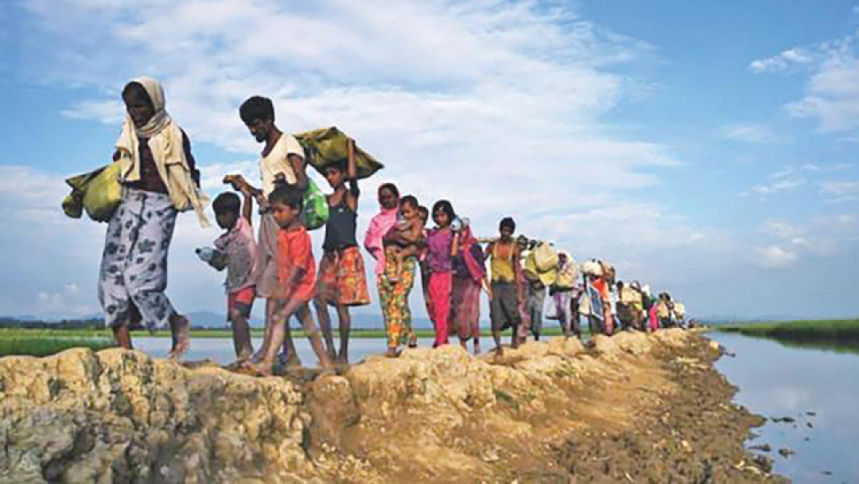Hope of justice for Rohingyas getting brighter

The fight for justice for Rohingyas is gaining momentum with more countries joining the genocide case with the International Court of Justice (ICJ), while the Myanmar military junta that committed genocide against the ethnic group now faces tougher resistance since its coup in 2021.
"This is really good for us. The Gambia will see it isn't alone anymore and the case now gets very strong," said Germany-based Nay Say Lwin, coordinator of the Free Rohingya Coalition, a global organisation.
On November 15, Denmark, France, Germany, the Netherlands, Britain, and Canada filed a joint declaration of intervention in the case filed by The Gambia in 2019, two years after some 750,000 Rohingyas fled a brutal military crackdown.
The six countries cited a "common interest in the accomplishment of the high purposes" of the 1948 convention on the prevention and punishment of genocide.
Meanwhile, Maldives filed a separate declaration.
Tania von Uslar, director-general for Germany's Legal Affairs, said they want to make a contribution in combating genocide and are particularly focused on violence against women and children.
Under the ICJ's rules, the declarations mean these countries will be able to make legal arguments in the case.
The Rohingyas, who have been denied citizenship, and rights to freedom of movement and education in Myanmar's Rakhine State despite their living there for generations, has been facing persecution since the 1980s and fled to Bangladesh and other countries.
A UN fact-finding mission found the 2017 crackdown by the Myanmar military included "genocidal acts". The US also declared it a genocide in 2021 and committed support to the ICJ case.
Myanmar, however, has denied the allegations of genocide, claiming the UN findings were "biased and flawed", but the ICJ rejected Myanmar's objections, paving the way for the case to be heard in full.
Nay Say Lwin said these countries had earlier expressed intention to intervene but now they have officially done it.
"The Rohingya community has never seen such support from the international community. These countries will provide evidence, especially on violence against women and children to the ICJ.
"We are hoping more countries will intervene the ICJ case as more than 150 countries are party to the genocide convention."
The armed forces in Myanmar are now taking control of vast parts of the country, putting pressure on the junta, he told this correspondent on November 23.
"We are now more optimistic than before that the ICJ will give a final verdict by 2025. On the other hand, the International Criminal Court is also investigating the genocide case, while another is also being heard at an Argentine court."
Shireen Huq, co-convener of Bangladesh Civil Society for Justice for the Rohingya, said intervention by more countries is definitely creating more pressure on the Myanmar junta.
"Their support – both financial and technical – in collecting and presenting evidence of genocide to the ICJ will greatly help the success of the case."
The fact that Myanmar junta is now facing pressure from the armed groups fighting for democracy is a huge toll on the military.
"While the ICJ case getting stronger will mount further pressure on them," she added.
Prof Imtiaz Ahmed, of International Relations at Dhaka University, said, "Running the case at the ICJ requires a lot of money. I hope that the new countries intervening will come up with funds."
Rohingyas must get justice for what they have been facing from Myanmar junta for decades, he added.

 For all latest news, follow The Daily Star's Google News channel.
For all latest news, follow The Daily Star's Google News channel. 



Comments